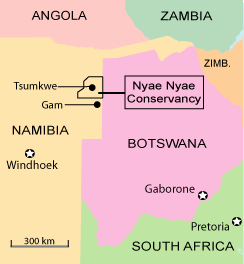The Namibian farmers who invaded Ju/’hoansi lands with their cattle earlier this year are appealing to the High Court of Namibia to reverse the government’s decision to auction off their animals. The New Era, an official Namibian publication, reported last week that government lawyers recently wrote to Patrick Kauta, the attorney for the farmers, to tell him that agency officials will be selling their cattle, which have been impounded at Mangetti since they were rounded up after the invasion.
 The Ju/’hoansi live in a large, fenced tract of land known as the Nyae Nyae Conservancy, which is managed by the people themselves for their own long-term best interests: the health of the land and the sustainable extraction of natural resources. Some of the wild animals in the Conservancy, which the people hunt for food, are believed to harbor foot and mouth disease. The fences that surround the area are supposed to keep out the cattle of the neighboring peoples, in order for Namibia to retain its international reputation as being free of the disease. Certification of the national beef industry as being free of the disease is essential to the economy of the country as well as to its farmers.
The Ju/’hoansi live in a large, fenced tract of land known as the Nyae Nyae Conservancy, which is managed by the people themselves for their own long-term best interests: the health of the land and the sustainable extraction of natural resources. Some of the wild animals in the Conservancy, which the people hunt for food, are believed to harbor foot and mouth disease. The fences that surround the area are supposed to keep out the cattle of the neighboring peoples, in order for Namibia to retain its international reputation as being free of the disease. Certification of the national beef industry as being free of the disease is essential to the economy of the country as well as to its farmers.
But in May this year, some farmers in the area of Gam, immediately to the south of the Conservancy, cut the fences and brought their cattle onto the Ju/’hoansi land. They said they were afraid their animals would eat poisonous plants growing in their own territory. They evidently did not count on the immediate outcry about their invasion of Ju/’hoansi property, and they must not have thought about the consequences to their cattle—and themselves—of their animals being possibly exposed to the dread disease.
Once the invasion began, 29 farmers brought more than 1,000 cattle into the reserve, but the government acted fairly quickly. Agency officials removed all of the livestock and they decided to hold them in quarantine, pending their sale for slaughtering. Some of the invaders were arrested, though they are now out of jail on bail.
The government appears to be obfuscating about the current situation. Last week, Andrew Ndishishi, Permanent Secretary of the Ministry of Agriculture, Water and Forestry, confirmed that the cattle are still quarantined at Mangetti, but he would not say anything more about the issue. He said that the matter is being handled by a government attorney, so he couldn’t comment. The acting Attorney General for Namibia also would not comment—his agency is only handling legal matters. The other agency would have to answer questions about what is happening with the cattle.
Separately, the Ju/’hoansi have retained the services of a group called the Legal Assistance Centre to represent them in a lawsuit for damages of N$530,000 (US$70,000) against the farmers who participated in the invasion. The Ju/’hoansi claim that the invaders, or their cattle, harmed their income from trophy hunting, used their water resources, damaged their harvests of an important herbal product, consumed the forage on their lands, and of course infringed on their rights. LAC has admitted to delays in preparing its case, but it intends to press the matter forward for the Ju/’hoansi.